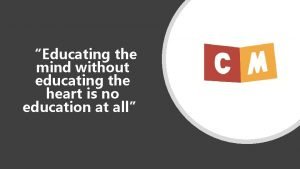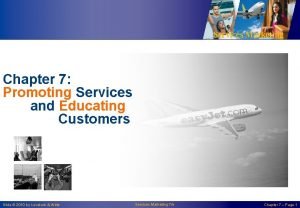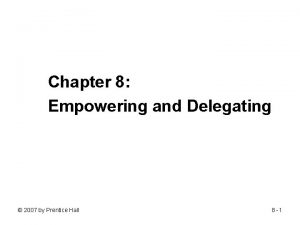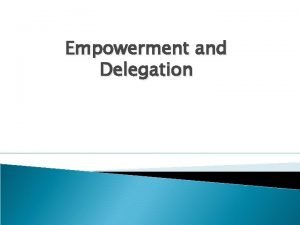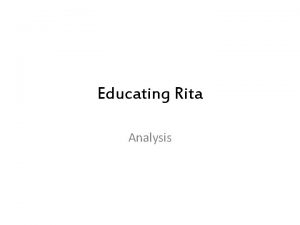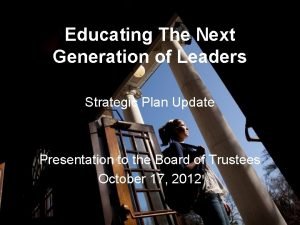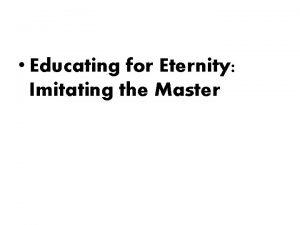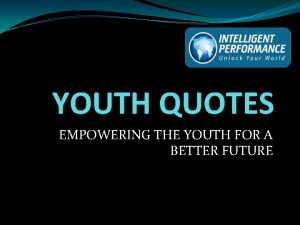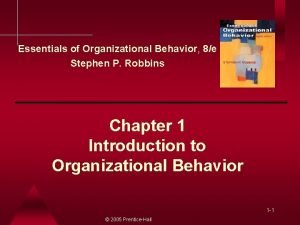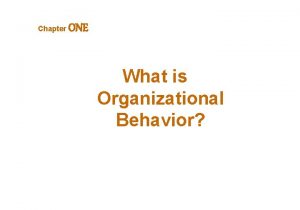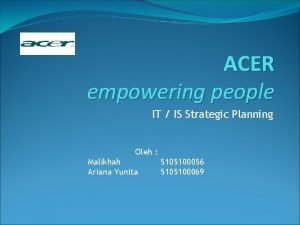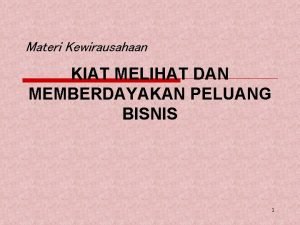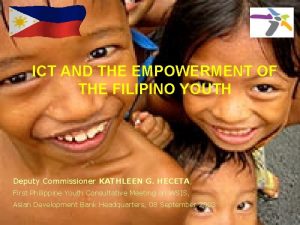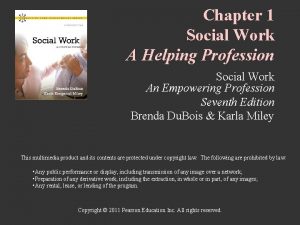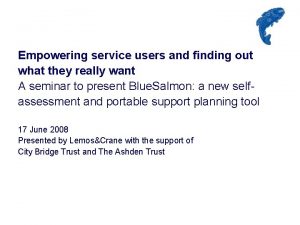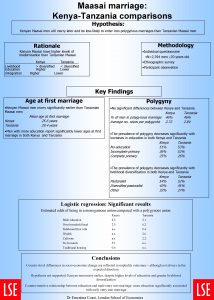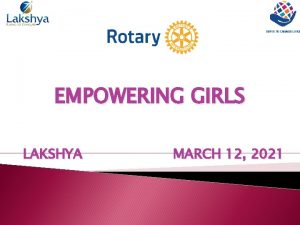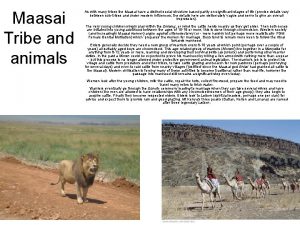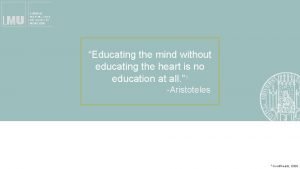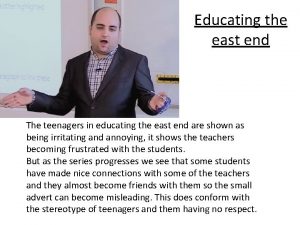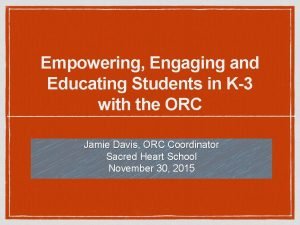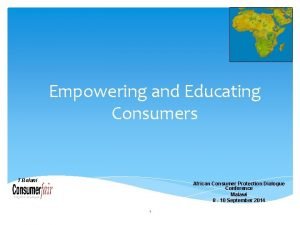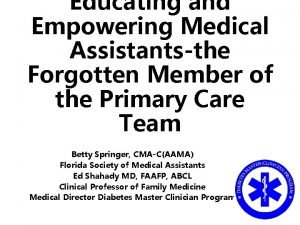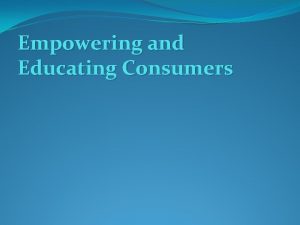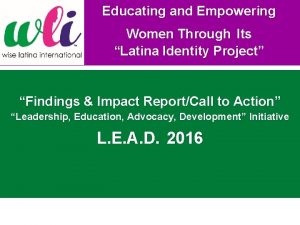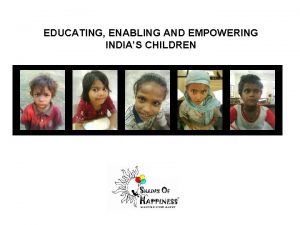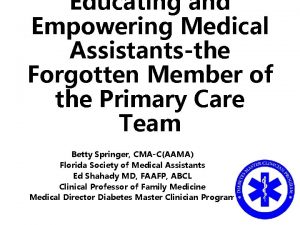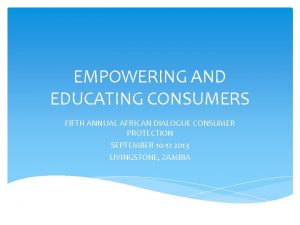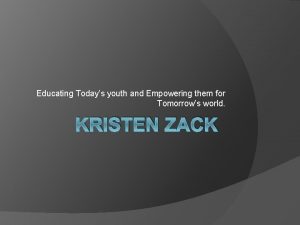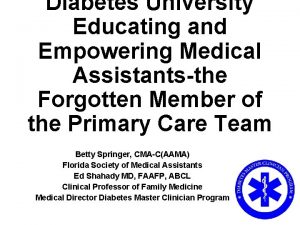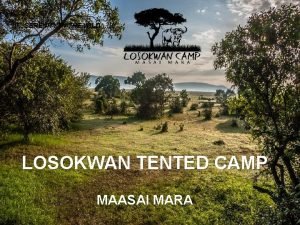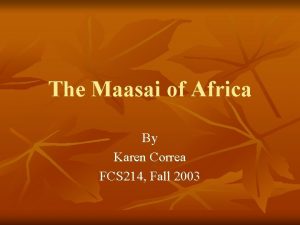Maasai Girls Education Fund Educating Girls and Empowering























- Slides: 23

Maasai Girls Education Fund Educating Girls and Empowering Women

Mission To improve the literacy, health and economic well-being of Maasai women in Kenya and their families through education of girls and their communities.

The Statistics o 48 out of 100 girls enroll in primary school o 5 of them will make it to secondary school o Less than 1 will go to college

Why? o Poverty and early marriage o Teen pregnancy o Female genital mutilation (FGM) o HIV/AIDS

Poverty and Early Marriage o o The Maasai are one of the poorest ethnic groups in Kenya. Daughters are considered a financial burden and a dowry, paid to the bride’s family, offers relief to Maasai families. Fear of pregnancy, which is a disgrace prior to marriage and lowers the bride price, perpetuates the practice of early marriage. Early marriage is the most common reason that Maasai

“You can marry a man of any age, your father’s age, even older than your father, and you don’t have a right. They pay a dowry that’s five cows and you go. ” Simantoi Kilama, MGEF Alumna

Teen Pregnancy o o o Discussing sex is taboo in Maasai culture, and so, girls are not told how pregnancy happens or how they can avoid it. When a Maasai girl reaches puberty, she is required to leave her father’s home and sleep elsewhere. Without proper supervision, she is vulnerable to sexual advances from men, placing her at risk of contracting HIV and becoming pregnant. Teen pregnancy is the second most frequent reason that Maasai girls drop out of school.

Female Genital Mutilation (FGM) o o As a prelude to marriage, approximately 90% of Maasai girls undergo a dangerous practice called FGM. Side effects include psychological trauma, an excruciating recovery process, and even death. Circumcision increases the risk of mother and infant mortality. Uncircumcised girls are often outcast, bullied, and considered ineligible for marriage.

HIV/AIDS o o Statistics show that girls in Kenya between the ages of 15 to 24 are four to six times more likely to become infected with HIV than boys. Though the average national HIV infection rate is six-percent, the Maasai have a staggering infection rate of thirteen-percent. As with other sex-related topics, Maasai girls are not taught about HIV and how it is spread. Maasai girls are often seduced by older men – who are more likely to have HIV – as they are more successful at negotiating unprotected sex, promising money and security.

Where We Are… MGEF serves three districts in Southern Kenya: Kajiado, Ngong, and Loitok. Two-thirds of the Maasai live in these semi-arid lands between Nairobi and the Tanzanian border, many in remote villages (as shown below):

Beginnings 1999: Founder and President, Barbara Lee Shaw, visited a Maasai village near Kilonito, Kenya for a freelance photography project. While there, she met Ntanin, a young girl who had never been to school, and learned that numerous cultural and economic barriers prevent other Maasai girls from going to school.

Our First Student Ntanin is her father’s 22 nd child and the 6 th child of his third wife (he has four). Not one girl in her family had enrolled in school. Barbara asked Ntanin’s father if she could pay for her education and, when his answer was “yes, ” she began sponsoring Ntanin.

Timeline o o o 1999: Upon her return to the US, Barbara shared this story with her friends and family. Soon, they were asking to sponsor Maasai girls, too! 2000: Maasai Girls Education Fund (MGEF) was established 2001: MGEF became a 501(c)3 nonprofit

Beyond Scholarships: Educating the Community

Community Education Programs o o o Life Skills Workshops for Girls Annual Mentoring Workshop Mothers Workshops Business Training for Rural Maasai Women Life Skills Workshops for Boys Chiefs and Elders Workshops

Life Skills Workshops for Girls Challenge: In Maasai culture, sex is a taboo subject. Girls are not taught how to protect themselves against pregnancy and HIV/AIDS. They also have no knowledge of FGM until it is being performed on them. Both circumcision and early marriage are done without consent, and girls don’t know they have the legal right to refuse. Solution: Life Skills Workshops educate Maasai girls about pregnancy and how to prevent it, HIV/AIDS and how it is spread, as well as national laws that forbid early marriage and FGM. The girls are given resources and informed about government and tribal authorities who can stop forced marriage and circumcision. They are empowered to make

Annual Mentoring Workshop Challenge: When Maasai girls reach puberty they are strongly pressured, if not forced, to drop out of school and marry. If they have not been circumcised, the return to their home village during school break could turn into an FGM ceremony. Adolescent girls are also vulnerable to sexual advances from men, increasing their chance of contracting HIV or becoming pregnant. Solution: o The Annual Mentoring Workshop is a three-day gathering of current MGEF students, alumnae, and professional Maasai women, where girls are taught life skills and provided mentors for advice, support, and inspiration.

At the Annual Mentoring Workshop, students are asked to think about what they want to be, to envision a better future in spite of the challenges they face, and to believe in themselves. This list was compiled in December 2011.

Mothers Workshops Challenge: Cultural taboos prevent mothers from talking to their daughters about sex, and because women have no power in their family or community, they cannot effectively advocate for the girl child. In addition, many myths persist about the benefits of FGM, perpetuating the practice. Solution: The Mothers Workshop explains the importance of talking to daughters about teen pregnancy, HIV, and the adverse impact of FGM on women’s health: death, difficult child birth, and increased infant and maternal mortality. They are also encouraged to build safe, protected homes for the daughters who are no longer allowed to reside in their father’s hut.

Business Trainings for Rural Maasai Women Challenge: Maasai women have no rights in their community or home. Men hold all the power and make all the decisions, both in the private and public sphere. With little to no education or source of income, Maasai women face a life of subordination and poverty. Solution: Business Training provides management tools and seed grants to rural Maasai women. When a Maasai woman gains economic power, she acquires a voice in family decisions. She has the resources to educate all her children and to protect them from early marriage and FGM.

Life Skills Workshop for Boys & Chiefs and Elders Workshops Challenge: In order to achieve gender equality, men and boys must be involved. Only men have the authority to change cultural traditions and practices that contribute to the spread of HIV and the high level of teen pregnancy. Solution: The Life Skills Workshops for men and boys invoke pride in the man to raise his family out of poverty, prevent the spread of HIV and protect against teen pregnancy, and end violence against women, including FGM. The connection between certain cultural practices and HIV are explained, especially where it involves promiscuity. They learn that FGM also contributes to the spread of HIV, and that it is harmful to girls and women, a painful procedure that sometimes results in death, makes childbirth more difficult, and increases maternal and infant

UN Millennium Goals MGEF programming supports the following UN Millennium Goals: 4. Reduce child mortality 1. Eradicate extreme poverty and hunger 5. Improve maternal health 2. Achieve universal primary education 6. Combat HIV/AIDS, Malaria, and other diseases 3. Gender equality

Educating the Community MGEF and Dining for Women are partnering to fund: o Life Skills Workshops for Girls o Annual Mentoring Workshop o Business Trainings for Rural Maasai Women o Mothers Workshops
 Educating the mind without educating the heart source
Educating the mind without educating the heart source Entries are made to the petty cash account when
Entries are made to the petty cash account when Promoting services and educating customers
Promoting services and educating customers Promoting services and educating customers
Promoting services and educating customers Empowering and delegating
Empowering and delegating Delegation and empowerment
Delegation and empowerment Educating rita analysis
Educating rita analysis Educating for careers
Educating for careers Educating the next generation of leaders
Educating the next generation of leaders Educating for eternity
Educating for eternity Educating rita context
Educating rita context Empowering youth quotes
Empowering youth quotes Empowering people in ob
Empowering people in ob Empowering people in ob
Empowering people in ob Empowering people in ob
Empowering people in ob Acer empowering people
Acer empowering people Empowering minds curriculum
Empowering minds curriculum Empowering business
Empowering business Empowering imagination
Empowering imagination Filipino advocacy using ict
Filipino advocacy using ict Social work: an empowering profession 9th edition chapter 1
Social work: an empowering profession 9th edition chapter 1 Empowering service users
Empowering service users Golden bricks writing
Golden bricks writing Monetizing energy data
Monetizing energy data
